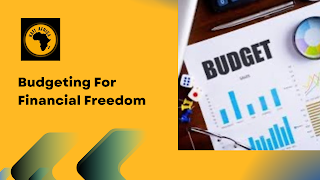Budgeting for Financial Freedom: Simple Tips
Everyone desires financial freedom, but achieving it requires discipline, patience, and a good strategy. Budgeting is the foundation of financial success, as it allows you to manage your money effectively, minimizes stress, and develops wealth.
Understanding Budgeting
Budgeting is not about denying oneself fun or pleasant things in life but about allocating resources in accordance with your financial goals.
A budgeting system can help you:
- Keep track of your income and expenses.
- Identify areas for improvement.
- Spend prudently.
- Increase savings and investments.
- Reduce debt.
Simple Budgeting Tips to Get Started Today
- Applying the 50/30/20 Rule: Allocate 50% of your money for your fundamental necessities, such as housing, utilities, and food; 30% towards discretionary spending; and 20% towards saving and debt repayment.
- Track Expenses: Record every transaction using a budgeting app such as Mint, Personal Capital, a spreadsheet, or a notebook.
- Create a Budget Plan: Set financial goals, categorize expenses, and assign amounts.
In creating a budget plan, you need to;
- Prioritize Needs over Wants: Distinguish between essential and discretionary spending.
- Automate Savings: Set up automatic transfers to savings and investment accounts.
- Cut Unnecessary Expenses: Identify areas for reduction (subscription services, dining out).
- Debt Snowball: Focus on paying high-interest debt first.
- Emergency Fund: Save 3-6 months' worth of expenses.
- Review and Adjust: Regularly review budget performance and make adjustments.
Budgeting Tools and Resources
The following budgeting tools, if deployed, help you to budget and track your expenses. They include;
- Budgeting apps: Mint, Personal Capital, YNAB
- Spreadsheets: Google Sheets, Microsoft Excel
- Budgeting software: Quicken, GnuCash
- Financial advisors or planners
Common Budgeting Mistakes
- Lack of tracking
- Inaccurate income estimation
- Insufficient emergency fund
- High-interest debt
- Failure to adjust
Real-Life Budgeting Examples
- Paying off $5,000 credit card debt in 12 months
- Building a $10,000 emergency fund
- Saving for a down payment on a home
Conclusion
Budgeting for financial freedom requires commitment, discipline, and patience. By implementing these simple tips, you'll be well on your way to achieving financial stability and security.
Remember:
-Budgeting is a journey, not a destination.
-Small changes add up over time.
-Financial freedom is within reach.


No comments:
Post a Comment
For each module, you are required to comment with the following details:
- Full Name:
- Country:
- Cohort:
- Short Summary: (A brief summary of what you learned from this module written in your own words)